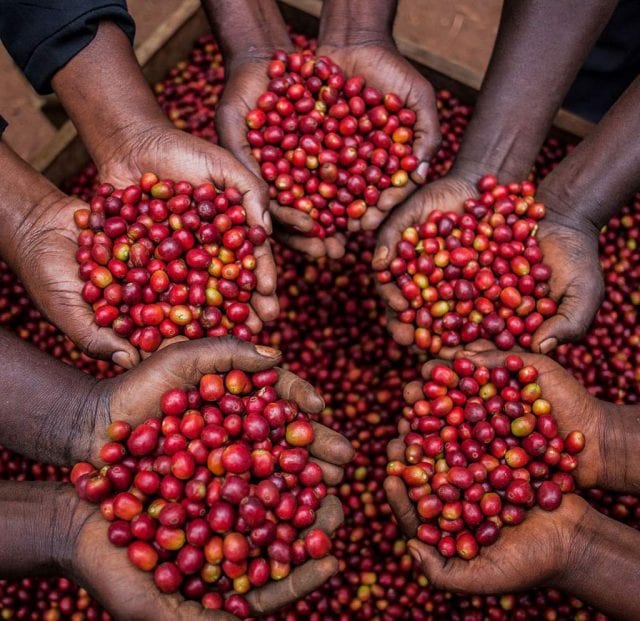Classification of Ugandan coffee beans in Uganda, the second largest coffee producer in Africa
Uganda is the second largest coffee producer in Africa, the fourth largest Robusta coffee producer and the tenth largest coffee producer in the world.
One out of every 10 coffee farms in the world is located in Uganda, where 1.7 million coffee households account for 10 per cent of global farms.

Coffee production in Uganda may still be viable in the coming decades, but the future environmental scenario requires our attention now; if we are not fully prepared, high levels of deforestation, extreme weather, rampant coffee tree diseases and unstable social factors all threaten the future of Ugandan coffee.
Where and who makes coffee in Uganda?

Ugandan coffee is grown in five regions of Uganda: central, western, southwestern, northern and eastern. The western region is famous for producing the highest quality coffee.
The production of Arabica and Robusta is most commonly located in southwestern Uganda.
Greetings from the Origin of Robusta!
Robusta coffee is native to the Nganda region of Uganda. Wild species are still found at the foot of the Ruwenzori Mountains in western Uganda.
The ratio between Rob Sta Arabica and production is 4:1. About 77% of annual production is robusta coffee produced in central Uganda. Arabica coffee is produced on the borders of Rwanda, Kenya and the Democratic Republic of the Congo and accounts for 23 per cent of the country's production.
Busta coffee is 8 to 1400 meters above sea level and Arabica coffee is 2300 to 6000 meters above sea level. High altitude, especially Robusta, Uganda, makes it very unique and has inherent quality characteristics / attributes.
Uganda is a landlocked country, so coffee must be exported more than 1200 kilometers (nearly 746 miles) of road to Mombasa, Kenya. The cost and time of this journey limit the potential of Uganda to export non-commodity grade coffee or roasted / instant coffee.
Some sources claim that up to 20 per cent of Ugandan coffee is certified but not so sold. Only UTZ certification or organic certification is reported at the time of export. The number of other certifications, such as Fair Trade or Rainforest Alliance, is either unspecified or not exported. From 2007 to 2015, certified coffee accounted for 1.2% of Robusta coffee and 5% of Arabica coffee exports.
Uganda uses a well-designed quality grading system. Certificates of various levels are issued by the Uganda Coffee Development Authority (UCDA). Caffeine varieties, processes, coffee bean size and other quality attributes, as well as certification and origin vary.
Coffee is an important economic driver in Uganda.
Uganda has between 120 and 1.7 million households producing coffee: this is for every four rural households, or five households, in the country.
In Uganda, about four or six people live in coffee families.
Although corn has a larger land footprint (2.4 million hectares), coffee planted with a significant reduction (390000 hectares) accounted for 20 per cent (US $555 million) of the country's total exports in 2018. Therefore, economic value makes coffee very important on the political agenda.
Important Notice :
前街咖啡 FrontStreet Coffee has moved to new addredd:
FrontStreet Coffee Address: 315,Donghua East Road,GuangZhou
Tel:020 38364473
- Prev

The History and Development Story of Salvadoran Coffee beans and the Flavor and Taste characteristics of Salvadoran Mocha beans
In the Apaneca-Ilamatepec volcano region of the Apaneca-Ilamatepec volcano region of the national El Salvador, Finca La Esperanza hopes to win the host Pacas Pacas family elevation 1700 masl mocha adzuki bean Natural Japanese taste thick, rich, with cardamom, wine, milk chocolate fragrance, more than the previous year, more
- Next

What is the exhaust valve coffee bag one-way exhaust valve role of coffee beans exhaust and oxidation
I believe that people who love coffee have had the experience of buying coffee beans, and we all know that the degassing valve is an important part of coffee packaging. Roasted coffee beans are very susceptible to oxidation, which can cause coffee to lose flavor and degrade coffee oils. Therefore, roasted coffee beans should be kept in a closed, low-temperature environment and avoid strong light. So the exhaust valve goes to
Related
- Detailed explanation of Jadeite planting Land in Panamanian Jadeite Manor introduction to the grading system of Jadeite competitive bidding, Red bid, Green bid and Rose Summer
- Story of Coffee planting in Brenka region of Costa Rica Stonehenge Manor anaerobic heavy honey treatment of flavor mouth
- What's on the barrel of Blue Mountain Coffee beans?
- Can American coffee also pull flowers? How to use hot American style to pull out a good-looking pattern?
- Can you make a cold extract with coffee beans? What is the right proportion for cold-extracted coffee formula?
- Indonesian PWN Gold Mandrine Coffee Origin Features Flavor How to Chong? Mandolin coffee is American.
- A brief introduction to the flavor characteristics of Brazilian yellow bourbon coffee beans
- What is the effect of different water quality on the flavor of cold-extracted coffee? What kind of water is best for brewing coffee?
- Why do you think of Rose Summer whenever you mention Panamanian coffee?
- Introduction to the characteristics of authentic blue mountain coffee bean producing areas? What is the CIB Coffee Authority in Jamaica?

